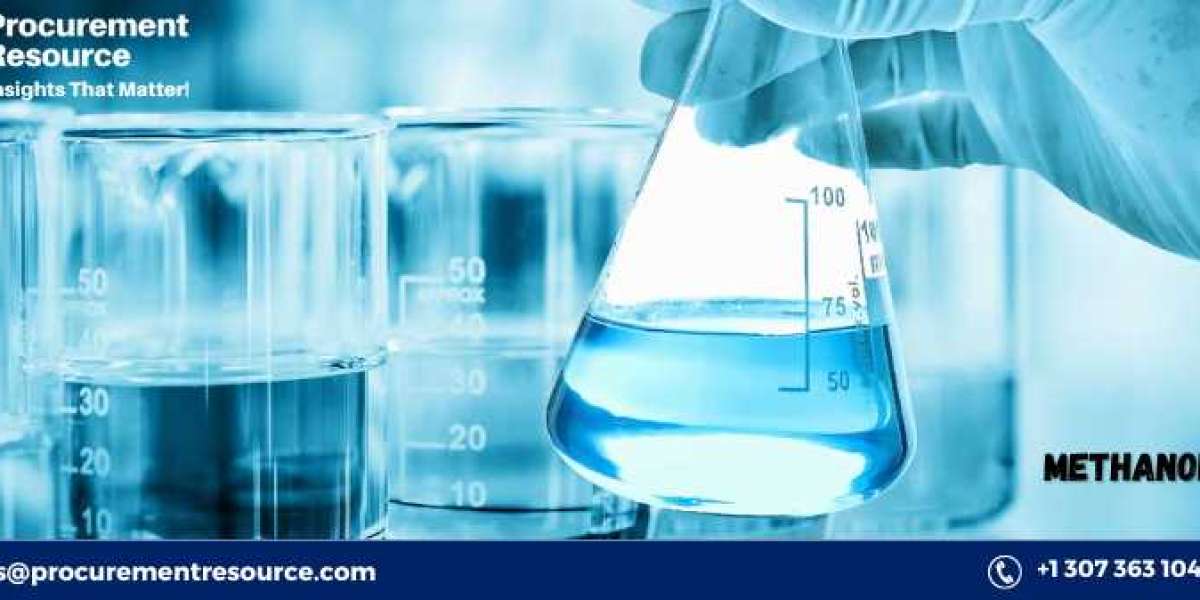Methanol, a versatile and essential chemical, serves as a building block for a wide range of products, including formaldehyde, acetic acid, and various fuels. Understanding the Methanol Production Process with Cost Analysis is crucial for stakeholders in the chemical industry, as it provides insights into the factors that influence the efficiency, cost-effectiveness, and sustainability of methanol production. This report offers an in-depth analysis of the methanol production process, covering procurement resource assessment, an overview of methanol, market drivers, raw material requirements, and a comprehensive breakdown of costs and key process information. Additionally, it explores how a personalized report can substantiate your business strategies.
Request Free Sample - https://www.procurementresource.com/production-cost-report-store/methanol/request-sample
Procurement Resource Assessment: Methanol Production Process
The Procurement Resource Assessment in the methanol production process involves evaluating and securing the necessary resources required for efficient and profitable methanol production. This assessment covers various stages, from feedstock acquisition and plant setup to energy supply and operational efficiency.
- Feedstock Acquisition: The primary raw materials for methanol production are natural gas, coal, and biomass. Natural gas is the most commonly used feedstock due to its availability and cost-effectiveness. Securing a stable and cost-efficient supply of feedstock is critical for maintaining consistent production and controlling costs.
- Plant Setup and Infrastructure: The setup of a methanol production plant requires significant investment in infrastructure, including reactors, distillation columns, compressors, and storage tanks. The procurement of high-quality equipment and technology is essential to ensure the plant's operational efficiency and safety.
- Energy Supply: Methanol production is an energy-intensive process, particularly when using natural gas or coal as feedstocks. Securing a reliable and cost-effective energy supply, whether from electricity, natural gas, or alternative sources, is crucial for optimizing production costs.
- Labor and Expertise: Skilled labor and technical expertise are required to operate and maintain a methanol production plant. The procurement of qualified personnel, along with ongoing training and development, ensures the smooth operation of the facility and minimizes downtime.
- Environmental Compliance: Compliance with environmental regulations is a critical aspect of methanol production. This includes managing emissions, waste, and effluent treatment. Procuring the necessary technologies and systems to meet regulatory requirements is essential for avoiding penalties and ensuring sustainable operations.
Understanding Methanol
Methanol, also known as wood alcohol, is a simple alcohol with the chemical formula CH₃OH. It is a colorless, volatile liquid that is highly flammable and toxic if ingested. Methanol is a crucial industrial chemical used in the production of formaldehyde, acetic acid, and various other chemicals. It is also used as a solvent, antifreeze, fuel, and as an essential component in the production of biodiesel.
Methanol is produced primarily through the catalytic conversion of natural gas, coal, or biomass. The most common method of methanol production involves the steam reforming of natural gas to produce synthesis gas (a mixture of hydrogen, carbon monoxide, and carbon dioxide), followed by catalytic conversion of the synthesis gas to methanol.
Due to its versatility and wide range of applications, methanol is a key commodity in the global chemical industry. It plays a significant role in energy production, particularly as a fuel and as a hydrogen carrier for fuel cells. Methanol’s importance is further highlighted by its use in the production of methyl tert-butyl ether (MTBE), a gasoline additive that improves combustion efficiency and reduces emissions.
Market Drivers
The Market Drivers for methanol production are influenced by several factors, including global demand, technological advancements, government policies, and environmental concerns.
- Global Demand for Methanol: The global demand for methanol is driven by its diverse range of applications, including in the production of chemicals, fuels, and energy. The growing demand for methanol as a feedstock in the production of formaldehyde, acetic acid, and other chemicals has significantly boosted its market. Additionally, methanol's use as an alternative fuel and in the production of biodiesel has further driven demand.
- Technological Advancements: Advances in methanol production technology, such as improved catalysts, process optimization, and energy efficiency, have made methanol production more cost-effective and environmentally friendly. These technological innovations have enabled producers to reduce costs and increase production capacity, thereby driving market growth.
- Government Policies and Regulations: Government policies and regulations play a crucial role in shaping the methanol market. For instance, policies promoting the use of cleaner fuels and reducing greenhouse gas emissions have increased the demand for methanol as a fuel and as a feedstock for producing biofuels. Additionally, trade policies and subsidies can impact the global methanol market by influencing production costs and supply chains.
- Environmental Concerns: The growing focus on sustainability and reducing carbon emissions has driven the adoption of methanol as a cleaner alternative to traditional fossil fuels. Methanol's use in fuel cells, as a hydrogen carrier, and in the production of biodiesel aligns with global efforts to transition to more sustainable energy sources. This shift towards greener technologies is expected to continue driving the demand for methanol in the coming years.
Raw Materials Requirements
The Raw Materials Requirements for methanol production include the essential inputs such as natural gas, coal, or biomass, as well as catalysts, water, and energy.
- Natural Gas: Natural gas is the most commonly used feedstock for methanol production due to its availability, cost-effectiveness, and high hydrogen content. The process of steam reforming converts natural gas into synthesis gas, which is then catalytically converted into methanol.
- Coal: In regions where natural gas is less accessible, coal is used as an alternative feedstock for methanol production. The coal gasification process produces synthesis gas, which is then converted into methanol. However, coal-based methanol production is more energy-intensive and has a higher environmental impact compared to natural gas-based production.
- Biomass: Biomass, such as agricultural waste or wood chips, can also be used as a feedstock for methanol production. Biomass-to-methanol processes involve the gasification of biomass to produce synthesis gas, followed by catalytic conversion to methanol. Biomass-based methanol production is considered more sustainable and environmentally friendly but is less common due to higher costs and technological challenges.
- Catalysts: Catalysts are essential for the conversion of synthesis gas into methanol. Commonly used catalysts include copper-based or zinc-based compounds. The efficiency and lifespan of the catalysts are crucial factors in the overall cost and efficiency of the methanol production process.
- Water: Water is used in the steam reforming process and in cooling systems throughout the methanol production plant. The availability and cost of water, as well as the treatment of wastewater, are important considerations in the production process.
- Energy: Methanol production is energy-intensive, particularly in the steam reforming and gasification stages. The cost of energy, whether from natural gas, electricity, or alternative sources, is a significant factor in the overall production cost.
Costs and Key Process Information
The Costs and Key Process Information for methanol production involve the expenses associated with feedstock procurement, energy consumption, labor, and plant maintenance. Understanding these costs is essential for managing the profitability and efficiency of methanol production.
- Feedstock Costs: The cost of natural gas, coal, or biomass is the primary expense in methanol production. Fluctuations in feedstock prices can have a significant impact on the overall production cost. Securing long-term contracts or diversifying feedstock sources can help mitigate price volatility.
- Energy Costs: Energy consumption is a major component of the methanol production process. The costs associated with steam generation, electricity, and cooling systems must be carefully managed to optimize production efficiency. Advances in energy-efficient technologies can help reduce these costs.
- Labor and Operational Costs: Labor costs include the wages of skilled operators, engineers, and maintenance staff required to run the methanol production plant. Additionally, ongoing training, safety measures, and operational efficiency are critical factors in maintaining production levels and minimizing downtime.
- Plant Maintenance and Depreciation: Regular maintenance of reactors, compressors, distillation columns, and other critical equipment is necessary to ensure the smooth operation of the methanol production plant. The depreciation of equipment and infrastructure also needs to be accounted for in the overall cost analysis.
- Environmental Compliance Costs: Compliance with environmental regulations, including emissions control, waste management, and effluent treatment, is essential for sustainable methanol production. The costs associated with implementing and maintaining these measures must be factored into the overall production costs.
Looking for an Exhaustive and Personalized Report That Could Significantly Substantiate Your Business?
If you are seeking a more detailed and customized analysis of the methanol production process, including cost assessments, market insights, and strategic recommendations, we can provide a comprehensive report tailored to your specific business needs. Our personalized reports offer in-depth information that can help you make informed decisions, optimize production processes, and enhance profitability. Whether you are a producer, investor, or stakeholder in the methanol industry, our reports are designed to substantiate your business with accurate and actionable data.
About Us:
Procurement Resource is an invaluable partner for businesses seeking comprehensive market research and strategic insights across a spectrum of industries. With a repository of over 500 chemicals, commodities, and utilities, updated regularly, they offer a cost-effective solution for diverse procurement needs. Their team of seasoned analysts conducts thorough research, delivering clients with up-to-date market reports, cost models, price analysis, and category insights.
By tracking prices and production costs across various goods and commodities, Procurement Resource ensures clients receive the latest and most reliable data. Collaborating with procurement teams across industries, they provide real-time facts and pioneering practices to streamline procurement processes and enable informed decision-making. Procurement Resource empowers clients to navigate complex supply chains, understand industry trends, and develop strategies for sustainable growth.
Contact Us:
Company Name: Procurement Resource
Contact Person: Amanda Williams
Email: [email protected]
Toll-Free Number: USA Canada – Phone no: +1 307 363 1045 | UK – Phone no: +44 7537 132103 | Asia-Pacific (APAC) – Phone no: +91 1203185500
Address: 30 North Gould Street, Sheridan, WY 82801, USA



